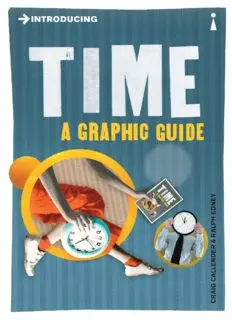Table Of ContentPublished by Icon Books Ltd, Omnibus Business Centre, 39-41 North Road,
London N7 9DP
email: [email protected]
www.introducingbooks.com
ISBN: 978-184831-772-7
Text copyright © 2001 Craig Callender
Illustrations copyright © 2012 Icon Books Ltd The author has asserted his moral
rights.
Originating editor: Richard Appignanesi No part of this book may be reproduced
in any form, or by any means, without prior permission in writing from the
publisher.
Contents
Cover
Title Page
Copyright
What is Time?
All Kinds of Clocks
Biological Clocks
Psychological Time
Is Time Merely in the Head?
Clocks and Time
How Long is an Interval of Time?
The Most Reliable Clocks
The Atomic Clock
Absolute, True and Mathematical Time
True Time
Opponents of Newtonian Time: Relationalism
A Scenario of Time without Change
Can Relationalism replace Absolute Time?
Conventionalism
A Universe Out of Sync?
The Nature of Time: Relative and Non-Relative
Tenseless and Tensed Theories of Time
Tensed Time
Tenseless Time
Representing Dimensions
The Fourth or Time Dimension
Diagrams of Space and Time
Picture of a “Tenseless” Life
The Now and the Here
The Problem of Motion and Change
McTaggart’s Argument
Avoiding McTaggart’s Trap
How Fast Does Time Flow?
Galilean Relativity
Frames of Reference
Einstein’s Relativity
Simultaneity is Relative to the Observer
The Spacetime Event
Lightcones
Time and Observer Dependency
Relativity and Tenses
Does Logic Allow Time Travel?
The Logic of Impossibility
The Book That No One Wrote
The Causal Loop
A Logical Contradiction of Time Travel
Logical Contradictions Cannot Occur
Personal Time
Dying at a Time Earlier Than Your Birth
Future Compatibility
Can We Change the Past?
Can We Affect the Past?
Two Sorts of Time Travel Stories
Does Physics Allow Time Travel?
Moving Clocks Run Slower
Small Savings in Time
General Relativity and Four-dimensional Curvature
Why We Don’t Need a Fifth Dimension
Spacetime Curvature
General Relativity and Time Travel
Gödel’s Rotating Universe
Spacetime in a Rotating Universe
The Effect of Spacetime Curvature
Taub-NUT-Misner Spacetime
Gödel’s Complete Spacetime Travel
Is Gödelian Time Travel Possible?
Gödel Against Tenses
Another Problem for the Tensed Theory
Was Gödel Wrong?
Cosmic String Theory
Wormholes in Spacetime
Wormholes May Not Allow Travel
Exotic Possibilities For Time
Möbius Twist in Space
Möbius Twist in Time
Branching Time
Does Space “Run Out”?
Finite Space Without Limit
Geroch’s Theorem
Eternal Recurrence
Travelling to Big Bang
A Philosophical Objection
Closed and Open Time
To Sum Up, So Far …
The Direction of Time
“Irreversible” Processes
Time Reversal Invariance
Seeing in Terms of Particles
The Science of Heat
Spontaneous Processes
The Law of Entropy
The Problem of Newtonian Particles, Again
Statistical Mechanics
A Statistical Asymmetry
Is Reversal Probable?
The Most Probable State of Entropy
The Loschmidt Paradox
In What Direction Does Entropy Increase?
The Universe’s Statistical Development
The Boundary Conditions of the Universe
An Unlikely Hypothesis
Why Does Entropy Really Increase?
The “Temporal Double Standard”
A Reversal of Time’s Arrow
Communication with the Time Reversed?
Time-reversed Communication
Quantum Gravity: The End of Time?
The Wheeler-DeWitt Equation
Rounding-up of Positions
The Perfect or “Master” Clock
The Inexistence of Time
A Better-known Mystery
Further Reading
About the Authors
Acknowledgements
Index
What is Time?
The great theologian and philosopher, St Augustine (AD 354-430), famously
wrote of his puzzlement in The Confessions.
After pointing out all the things he is able to say about time without knowing
what it is – for instance, that it takes time to say this – he admits that he really is
in a “sorry state, for I do not even know what I do not know!”.
WHAT IS TIME? IF NO ONE ASKS ME, I KNOW BUT IF I WANTED TO EXPLAIN IT TO ONE WHO ASKS ME… … I PLAINLY DO NOT KNOW
Augustine is not alone in his bewilderment. The question of what time is and
related puzzles – such as whether the past and future are real, whether time
travel is possible, and the explanation of the direction of time – are among the
most intractable yet fascinating questions asked.
All Kinds of Clocks
In everyday life, we are probably most familiar with time from two sources:
clocks, and our inner psychological experience of time.
Clocks are everywhere. There are grandfather clocks, watches, alarm clocks,
even incense clocks that let you tell the time through scent.
There are also natural clocks.
But clocks existed well before the modern invention of portable artificial ones.
Over four thousand years ago, the Egyptians used obelisk shadow clocks,
sundials, and water clocks which measured time by the flow of water passing
through a stone vessel.
By 1800 BC, the ancient Babylonians had divided the day into hours, the hour
into sixty minutes, and the minute into sixty seconds.
All the great civilizations of the past used the positions of the sun or stars to tell
the time.
These clocks were very accurate.
Looking at the stars with the naked eye, an ancient astronomer could tell the
time to within fifteen minutes. And anyone can tell roughly the time merely by
looking up at the sun.

